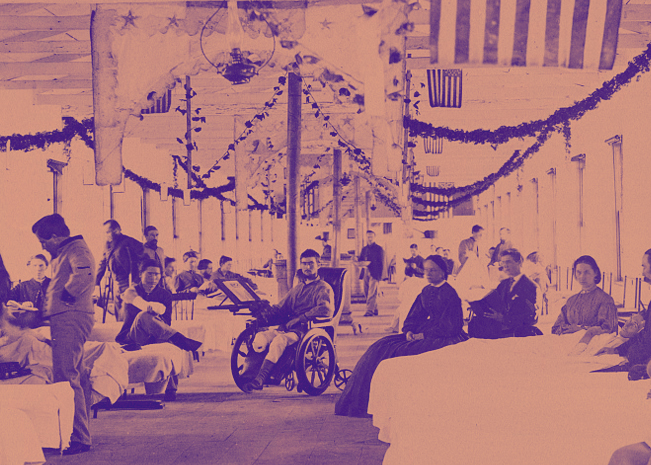The American Civil War helped nursing become a profession for women in the United States. Although some training for nurses did exist before the war, very few were women, with the exception of those in religious orders like the Sisters of Charity. There was a stigma attached to such menial work, and close contact with males who were not of one’s family was frowned upon. But the raging Civil War created a need that was too great to be ignored. Thousands of women, in both North and South, heeded the call. For some, the role was thrust upon them when the war came to their doorstep. For others, like Phoebe Pember and Susie King Taylor, becoming a nurse was an intentional decision.
Phoebe Pember made the choice to become a nurse in 1862. Writing of her decision, she stated, “The natural idea that such a life would be injurious to the delicacy and refinement of a lady—that her nature would become deteriorated and her sensibilities blunted, was rather appalling. But the first step only costs, and that was soon taken.”

Throughout the war, Phoebe Pember served as matron of Hospital Number 2 at Chimborazo. One of the largest military hospitals, Chimborazo was a sprawling complex on the Richmond’s eastern border, which eventually numbered 120 wards, each with a capacity of 40 to 60 patients. As chief matron, Pember often faced opposition from male staff members. One of her biggest struggles was over the control of whiskey. Although a Confederate law stated that matrons were responsible for dispensing whiskey, the surgeon-in-charge at first refused to release the barrel to her. Pember confronted him with a printed copy of the law. “I nailed my colors to the mast, and that evening all the liquor was in my pantry and the key in my pocket,” she later recalled.
Although Pember’s was an administrative position, she did have close contact with the patients. Among the most moving stories in her memoir, A Southern Woman’s Story, is that of Fisher, a young soldier who had been in the hospital about ten months, recovering from a wound near his hip. He eventually got to the point in his recovery where he was able to walk with the aid of crutches, but that night as he got into bed, blood began spurting from his wound. Phoebe quickly plugged the whole with her finger, but an examination by the surgeon revealed that a sliver of bone had severed his artery.
There was no way to repair the artery. Phoebe Pember was faced with “telling a man in the prime of life, and fullness of strength that there was no hope for him.” When Fisher asked how long he would live, she told him, “Only as long as I keep my finger upon this artery.” He gave her permission to let go, but Pember recalled, “I could not. Not if my own life trembled in the balance. Hot tears rushed to my eyes, a surging sound to my ears, and a deathly coldness to my lips. The pang of obeying him was spared me, and for the first time and last time during the trials that surrounded me for four years, I fainted away.”

Blood, death, and festering wounds became commonplace sights for female nurses. Susie King Taylor recalled, “It seems strange how our aversion to seeing suffering is overcome by war—how we are able to see the most sickening sights such as men with their limbs blown off and mangled by the deadly shell, without a shudder; and instead how we hurry to assist in alleviating their pain, bind up their wounds, and press the cool water to their parched lips with feelings only of sympathy and pity.”
Most memoirs of nursing experiences were written by white women, many of whom were upper class. Susie King Taylor’s Reminiscences of my Life in Camp is the only memoir written by an African American woman about her experiences with the army during the war. Susie King Taylor (née Baker) was only fourteen when she fled slavery and escaped to one of the Sea Islands off the coast of Georgia controlled by U.S. troops.

Educated in secret, she was soon placed in charge of a school. Within a year, she had married Edward King, a formerly enslaved man who had enlisted in the First South Carolina volunteers (later the 33rd USCTs). Susie King signed up as an army laundress, so she could travel with her husband’s regiment.
During her time with the 33rd, Susie served as much more than a laundress. Apart from teaching the men how to read and write, she volunteered as a nurse. Susie King was not afraid of caring for men with small pox because she had been vaccinated, and she believed in the power of sassafras tea to strengthen her blood. Tending to the wounded, she became accustomed to sights of death and noted how her outlook had changed.
Taylor and Pember are just two of thousands women who thrust convention aside to work with the sick and wounded. The war changed them, as it did countless others who were touched by it, but they helped change the world. As a result of their contributions, female nurses became an essential part of the medical profession by the 1880s.
